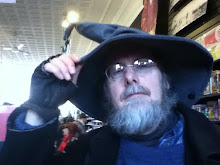Last month, I went to the annual gathering of Friends General Conference, one of the large umbrella organizations that many of the Yearly Meetings belong to. While there, I met several other Friends who also identify as Pagan. One of them wrote to me afterwards, asking himself questions about the compatibility of Quaker and Pagan religious paths. What follows is based on my response to him:
What Quakerism and Paganism share most profoundly is that both are experiential religions. Neither one demands that you believe a doctrine or recite a creed, but both lead you through experiences by which you come to experience the Divine directly.
What Quakerism and Paganism share most profoundly is that both are experiential religions. Neither one demands that you believe a doctrine or recite a creed, but both lead you through experiences by which you come to experience the Divine directly.
Those experiences often happen on a level that is wordless. The Gods transcend language, but human beings live by words. The Gods break us open, changing us at our deepest levels; words knit us together again in our new forms. All of the Quaker testimonies, and all of the Pagan myths, are afterthoughts, and subject to change.
Not random change. Not change at our whim. It is a common misconception about Quakers and Pagans that both religions allow you to believe whatever you want. The truth is that both religions ask you to undertake discernment. As a Pagan, you do not choose your patron deity; your Deity chooses you. As a Quaker, you do not (or should not—though many do) argue you point in a business meeting with logic and powerful rhetoric; you listen for the movement of Spirit within the meeting, and when the gathered body comes to unity, it is not consensus with each other, it is Unity with the Discerned Will of God.
There is a saying among Quakers, something along the lines of “Be faithful to the Light thou hast been given, and more will be given unto thee.” I don’t remember who said it, or even whether it was something from the eighteenth century or the twenty-first, but it expresses the idea of faithfulness as the grounding for continuing revelation. I haven’t heard Pagans express the same idea, but the same thing clearly happens if you look at Pagan practice over time, both of individuals and of communities. Each generation of Wiccan leaders since Gerald Gardner has become more grounded and more spiritually centered, and it feels like it is the Gods who have been leading us in that direction.
Paganism has had much less time to evolve than has Quakerism (70-some-odd years vs. 350 or so) and I think there are tools in the Quaker toolkit that could benefit Pagans greatly, especially our practice of corporate discernment. There also seem to be a lot of Quakers who hunger for some Pagan insights, like our explicit recognition of the sacredness of the Earth, and our flexibility in how we conceptualize and talk about the Divine. The two traditions don’t match up perfectly, but they complement one another in some powerful ways.
In framing his questions, the “Quagan” I met at FGC was defining Paganism by quoting from a variety of Pagan writings, and he looked to Faith and Practice to try to find equivalent Testimonies to what several writers had identified as defining characteristics of Paganism. In the end, I paraphrased George Fox:
You say Diana Paxton said this, and Margaret Fell said that: but what canst thou say? Art thou a child of Light and hast thou walked in the Light, and what thou speakest, is it inwardly from the Gods?

Comments
If it's helpful at all, the quote is from Caroline Fox, I think: "Live up to the Light thou hast and more will be granted thee."